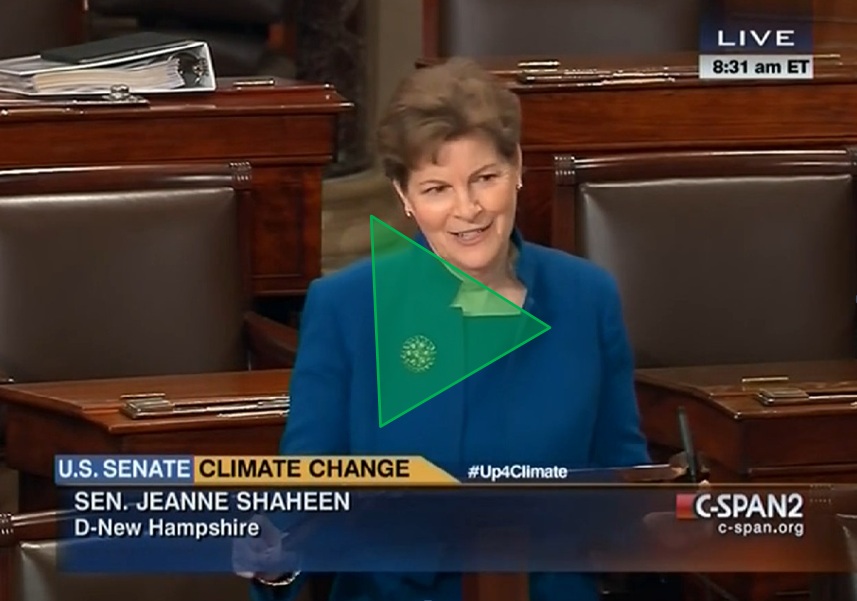In Case You Missed It: Shaheen Demands Action on Climate Change During All-Night Senate Session
Senators Speak on Senate Floor Throughout the Night to Raise Awareness About the Threat of Climate Change
(Washington, DC) – This morning U.S. Senator Jeanne Shaheen (D-NH) spoke on the Senate floor calling for swift action to address the threat climate change poses to our country as part of an all-night Senate session organized to highlight the environmental and economic consequences of inaction. Shaheen has been a leader on climate change in the Senate and recently reintroduced bipartisan energy efficiency legislation which will cut pollution by the equivalent of taking 22 million cars off the road while also creating 190,000 jobs and saving consumers $16.2 billion a year by 2030.
Senator Shaheen’s remarks as prepared for delivery are included below:
Senator Jeanne Shaheen, Climate Change Remarks
March 11, 2014
Mr. President, I want to agree with my colleagues because in New Hampshire we are also seeing the impact on our traditional industries of climate change. It is contributing to sea level rise, which imperils businesses and homes in coastal communities like Portsmouth. New Hampshire’s very popular Hampton Beach is already experiencing greater storm surges and beach erosion.
The outdoor recreation community could face shorter winters and less snow, resulting in fewer tourism dollars.
And wildlife and public health are becoming increasingly vulnerable to diseases. In New Hampshire, tourism is our state’s second largest industry. It accounts for $9.3 billion of the state’s economy, providing jobs and economic growth throughout the state.
But climate change could put some of New Hampshire’s best attractions in jeopardy.
The fall foliage in New Hampshire is a main draw for visitors from around the world, who spend millions annually to see our beautiful landscape. As climate change continues, warmer temperatures will cause the dulling and browning of "climate stressed" unhealthy trees.
Another driver of tourism in New Hampshire is our state’s many outdoor recreation activities, like downhill and cross-country skiing, snowshoeing and snowmobiling. As temperatures increase due to climate change, the ski industry has to make more snow, increasing their expenses. In fact EPA has predicted that by the end of the century, summers in New Hampshire could be as warm as summers in North Carolina, which would drastically shorten fall foliage without cooler temperatures starting in September.
Maple sugar production is being effected. It depends on prolonged cold temperatures with freezing nights, and warm daytime temperatures to create the optimal sugar content and sap production.
With warming underway, maple sugar producers in New Hampshire tell me they are already seeing an impact on production. According to a report by the New Hampshire Citizens for a Responsible Energy Policy, “Current modeling forecasts predict that maple sugar trees eventually will be completely eliminated as a regionally important species in the northeastern United States.” That’s if we fail to act on climate change.
New Hampshire’s seacoast is facing rising sea levels along the 18 miles of our ocean shoreline. The coastline is one of the most developed parts of the state, and flooding could devastate coastal towns and their economies. Ted Diers, administrator of the Watershed Management Bureau at the New Hampshire Department of Environmental Services, recently said: “Sea level has been rising at 6 to 8 inches a century. What we’re seeing right now is a tripling of that”.
Climate change is also expected to cause widespread tree deaths, which could cause extensive wildfires, large increases in pest and pathogen outbreaks and a lag in the establishment of new forests for several decades.
Climate change is also a threat to animals and their habitats. The moose population in New Hampshire is declining due to warming trends in winter and summer. New Hampshire’s moose population is down 40 percent this year and it’s the result of ticks. We have not had winters that are cold enough to cause those ticks to die off.
What’s happening in New Hampshire is happening around the world, and we must take action to slow these harmful trends. And we can make progress.
I look forward to continue working with my colleagues in the Senate to find smart and sensible solutions – New Hampshire’s economy and the health of our citizens, the United States’ economy and the world economy depend on it.
I yield the floor.
